Hampton, New Hampshire
Hampton is a town in Rockingham County, New Hampshire, United States. The population was 16,214 at the 2020 census.[2] On the Atlantic Ocean coast, Hampton is home to Hampton Beach, a summer tourist destination.
Hampton, New Hampshire | |
|---|---|
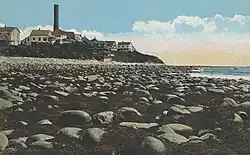 Great Boar's Head c. 1920 | |
 Seal | |
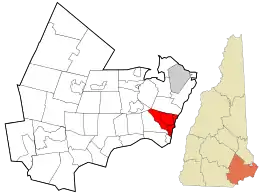 Location in Rockingham County and the state of New Hampshire. | |
| Coordinates: 42°56′15″N 70°50′20″W | |
| Country | United States |
| State | New Hampshire |
| County | Rockingham |
| Founded | October 14, 1638 |
| Incorporated | May 22, 1639 |
| Villages |
|
| Government | |
| • Board of Selectmen |
|
| • Town Manager | Jamie Sullivan |
| Area | |
| • Total | 14.6 sq mi (37.9 km2) |
| • Land | 12.9 sq mi (33.4 km2) |
| • Water | 1.7 sq mi (4.5 km2) 11.76% |
| Elevation | 36 ft (11 m) |
| Population (2020) | |
| • Total | 16,214 |
| • Density | 1,256/sq mi (484.9/km2) |
| Time zone | UTC-5 (Eastern) |
| • Summer (DST) | UTC-4 (Eastern) |
| ZIP codes | 03842–03843 |
| Area code | 603 |
| FIPS code | 33-33060 |
| GNIS feature ID | 0873616 |
| Website | hamptonnh |
The densely populated central part of the town, where 9,597 people resided at the 2020 census,[3] is defined as the Hampton census-designated place (CDP) and centers on the intersection of U.S. 1 and NH 27.
History
First called the "Plantation of Winnacunnet", Hampton was one of four original New Hampshire townships chartered by the General Court of Massachusetts, which then held authority over the colony. Winnacunnet is an Algonquian Abenaki word meaning "pleasant pines" and is the name of the town's high school, serving students from Hampton and the surrounding towns of Seabrook, North Hampton, and Hampton Falls.
In March 1635, Richard Dummer and John Spencer of the Byfield section of Newbury, Massachusetts, came round in their shallop, coming ashore at the landing, and were much impressed by the location. Dummer, who was a member of the General Court, got that body to lay its claim to the section and plan a plantation here. The Massachusetts General Court of March 3, 1636, ordered that Dummer and Spencer be given power to "To presse men to build there a Bound house."[4]
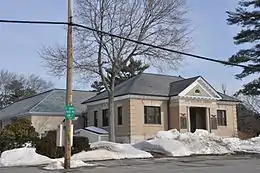
The town was settled in 1638 by a group of parishioners led by Oxford University graduate Reverend Stephen Bachiler, who had formerly preached at the settlement's namesake: Hampton, England.[5] The town, incorporated in 1639, once included Seabrook, Kensington, Danville, Kingston, East Kingston, Sandown, North Hampton and Hampton Falls. On the 18th of September 1679, the Acts of Privy Council records that Stephen Bachiler's son-in-law, "Christopher Hussey of Hampton, Esquire", was appointed by King Charles II to "govern the provence of New Hampshire" as a member of the newly established council of seven men.[6][7]
Also among Hampton's earliest settlers was Thomas Leavitt, who previously had been among the first settlers at Exeter. His descendant Thomas Leavitt, Esq., lived in Hampton Falls, and was the leading Democratic politician in southern New Hampshire for many years.[8] He made a noted early survey and plan of the town of Hampton in 1806.[9] James Leavitt, of the same family, occupied the home which had previously belonged to Gen. Jonathan Moulton.[9] Later members of the family ran Leavitts' Hampton Beach Hotel, a fixture in the area for generations.[9]
Construction of the railroad in the 1850s, as well as the Exeter and Hampton Trolley line, made Hampton's oceanfront a popular resort. Hampton Beach remains a tourist destination, offering shops, restaurants, beaches, and summer seasonal housing.
Geography
According to the United States Census Bureau, the town has a total area of 14.6 square miles (37.9 km2), of which 12.9 square miles (33.4 km2) are land and 1.7 square miles (4.5 km2) are water, comprising 11.76% of the town.[1]
Hampton is drained by the Hampton and Drakes rivers. The town lies fully within the New Hampshire Coastal watershed.[10] The highest point in Hampton is Bride Hill (approximately 150 feet (46 m) above sea level), near the town line with Exeter.
Adjacent municipalities
- North Hampton, New Hampshire (north)
- Seabrook, New Hampshire (south)
- Hampton Falls, New Hampshire (southwest)
- Exeter, New Hampshire (northwest)
Climate
| Climate data for Hampton, New Hampshire | |||||||||||||
|---|---|---|---|---|---|---|---|---|---|---|---|---|---|
| Month | Jan | Feb | Mar | Apr | May | Jun | Jul | Aug | Sep | Oct | Nov | Dec | Year |
| Record high °F (°C) | 61 (16) |
66 (19) |
79 (26) |
91 (33) |
99 (37) |
95 (35) |
101 (38) |
100 (38) |
94 (34) |
87 (31) |
76 (24) |
68 (20) |
101 (38) |
| Average high °F (°C) | 31.6 (−0.2) |
33.8 (1.0) |
42.2 (5.7) |
53.6 (12.0) |
65.0 (18.3) |
74.3 (23.5) |
79.8 (26.6) |
77.8 (25.4) |
70.3 (21.3) |
59.7 (15.4) |
48.5 (9.2) |
36.1 (2.3) |
56.1 (13.4) |
| Average low °F (°C) | 16.1 (−8.8) |
18.0 (−7.8) |
27.3 (−2.6) |
36.7 (2.6) |
46.7 (8.2) |
55.7 (13.2) |
61.6 (16.4) |
60.0 (15.6) |
52.2 (11.2) |
42.0 (5.6) |
33.8 (1.0) |
21.8 (−5.7) |
39.3 (4.1) |
| Record low °F (°C) | −16 (−27) |
−9 (−23) |
0 (−18) |
17 (−8) |
29 (−2) |
38 (3) |
47 (8) |
40 (4) |
32 (0) |
23 (−5) |
11 (−12) |
−9 (−23) |
−16 (−27) |
| Average precipitation inches (mm) | 3.59 (91) |
3.80 (97) |
5.02 (128) |
4.63 (118) |
4.45 (113) |
4.82 (122) |
3.77 (96) |
4.00 (102) |
4.19 (106) |
5.20 (132) |
4.09 (104) |
5.03 (128) |
52.59 (1,336) |
| Average snowfall inches (cm) | 18.6 (47) |
20.5 (52) |
10.9 (28) |
1.4 (3.6) |
0 (0) |
0 (0) |
0 (0) |
0 (0) |
0 (0) |
0.2 (0.51) |
0.8 (2.0) |
10.2 (26) |
62.6 (159) |
| Source: NOAA[11] | |||||||||||||
| Jan | Feb | Mar | Apr | May | Jun | Jul | Aug | Sep | Oct | Nov | Dec | Year |
|---|---|---|---|---|---|---|---|---|---|---|---|---|
| 41.7 °F (5.4 °C) | 39.0 °F (3.9 °C) | 39.0 °F (3.9 °C) | 42.6 °F (5.9 °C) | 50.2 °F (10.1 °C) | 58.1 °F (14.5 °C) | 65.1 °F (18.4 °C) | 66.4 °F (19.1 °C) | 63.0 °F (17.2 °C) | 56.7 °F (13.7 °C) | 50.0 °F (10.0 °C) | 45.3 °F (7.4 °C) | 51.4 °F (10.8 °C) |
Demographics
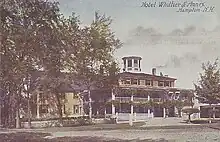
| Census | Pop. | Note | %± |
|---|---|---|---|
| 1790 | 853 | — | |
| 1800 | 875 | 2.6% | |
| 1810 | 990 | 13.1% | |
| 1820 | 1,098 | 10.9% | |
| 1830 | 1,102 | 0.4% | |
| 1840 | 1,320 | 19.8% | |
| 1850 | 1,192 | −9.7% | |
| 1860 | 1,230 | 3.2% | |
| 1870 | 1,177 | −4.3% | |
| 1880 | 1,184 | 0.6% | |
| 1890 | 1,330 | 12.3% | |
| 1900 | 1,209 | −9.1% | |
| 1910 | 1,215 | 0.5% | |
| 1920 | 1,251 | 3.0% | |
| 1930 | 1,507 | 20.5% | |
| 1940 | 2,137 | 41.8% | |
| 1950 | 2,847 | 33.2% | |
| 1960 | 5,379 | 88.9% | |
| 1970 | 8,011 | 48.9% | |
| 1980 | 10,493 | 31.0% | |
| 1990 | 12,324 | 17.4% | |
| 2000 | 14,973 | 21.5% | |
| 2010 | 14,976 | 0.0% | |
| 2020 | 16,214 | 8.3% | |
| U.S. Decennial Census[13] | |||
As of the census of 2010, there were 14,976 people, 6,868 households, and 4,079 families residing in the town. There were 9,921 housing units, of which 3,053, or 30.8%, were vacant. 2,221 of the vacant units were for seasonal or recreational uses. The racial makeup of the town was 96.1% white, 0.6% African American, 0.2% Native American, 1.2% Asian, 0.1% Native Hawaiian or Pacific Islander, 0.5% some other race, and 1.3% from two or more races. 1.7% of the population were Hispanic or Latino of any race.[14]
Of the 6,868 households, 23.2% had children under the age of 18 living with them, 47.2% were headed by married couples living together, 8.3% had a female householder with no husband present, and 40.6% were non-families. 33.7% of all households were made up of individuals, and 12.2% were someone living alone who was 65 years of age or older. The average household size was 2.16, and the average family size was 2.77.[14]
In the town, 17.5% of the population were under the age of 18, 7.0% were from 18 to 24, 22.3% from 25 to 44, 35.1% from 45 to 64, and 18.2% were 65 years of age or older. The median age was 47.0 years. For every 100 females, there were 99.4 males. For every 100 females age 18 and over, there were 99.0 males.[14]
For the period 2011–2015, the estimated median annual income for a household was $76,836, and the median income for a family was $98,642. Male full-time workers had a median income of $65,519 versus $51,009 for females. The per capita income for the town was $45,189. 5.9% of the population and 4.7% of families were below the poverty line. 5.9% of the population under the age of 18 and 2.5% of those 65 or older were living in poverty.[15]
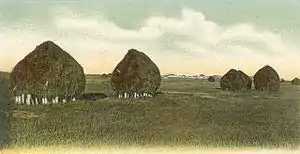
Education
Hampton is part of School Administrative Unit 90, which covers the elementary and middle schools,[16] and SAU 21 which includes Winnacunnet High School, a regional high school serving Hampton and several surrounding communities.
Sites of interest
Notable people
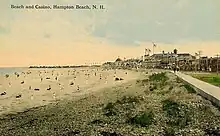
- Bill Alfonso (born 1957), professional wrestling personality
- Stephen Bachiler (1561–1656), English clergyman; town founder
- Eunice "Goody" Cole (c. 1590–1680), the only woman convicted of witchcraft in New Hampshire
- Henry Dearborn (1751–1829), physician, general and 5th U.S. Secretary of War
- Abraham Drake (1715–1781), Continental Army during the Revolutionary War and politician
- Jimmy Dunn, stand-up comedian, actor
- Christopher Hussey (1599–1686), English nobleman, one of the original founders of Nantucket, Massachusetts
- Thomas Leavitt (1616–1696), early settler
- Paul Maher Jr. (born 1963), author
- Stephen E. Merrill (1946–2020), 77th governor of New Hampshire
- Jonathan Moulton (1726–1787), Revolutionary War era brigadier general
- Jane Pierce (1806–1863), First Lady of the United States, wife of Franklin Pierce
- Robert Preston (1929–2021), businessman and New Hampshire state senator
- Trish Regan (born 1972), business news broadcaster
- Tristram Shaw (1786–1843), U.S. congressman
References
- "2021 U.S. Gazetteer Files – New Hampshire". United States Census Bureau. Retrieved December 29, 2021.
- "Census - Geography Profile: Hampton town, Rockingham County, New Hampshire". United States Census Bureau. Retrieved December 24, 2021.
- "Census - Geography Profile: Hampton CDP, New Hampshire". United States Census Bureau. Retrieved December 24, 2021.
- Sawyer, Roland D. (August 31, 1950). "The Pre-Bachiler Days of the White Men at Hampton". Some Account of the History of Earlier Hampton and its Daughter and Neighbor Towns. Hampton Union. Retrieved December 18, 2009.
- Boyd, M. "Stephen Bachiler". © 2004 by Michelle Boyd, All rights reserved. Retrieved November 7, 2017.
- Robertson, William (1834). A General History of North and South America: Including the Celebrated Work by Robertson. Mayhew, Isaac, and Company. p. 424. Retrieved November 6, 2017.
18th September 1679....The king was represented by a president and council of his own appointment....to govern the provence of New Hampshire.....Christopher Hussey of Hampton, Esquire...to be of the council...
- Dow, Joseph (1839). "An historical address: delivered at Hampton, New-Hampshire, on the 25th of ..." Printed by Asa McFarland. Retrieved November 7, 2017.
The names of the first settlers are Stephen Bachiler, Christopher Hussey...
- Brown, Warren (1900). History of the Town of Hampton Falls, New Hampshire, From the Time of the First Settlement Within Its Borders, 1640 until 1900. Manchester, N.H.: John B. Clarke Company.
- Dow, Joseph; Lucy Ellen Dow (1893). History of the Town of Hampton, New Hampshire, From Its Settlement in 1638 to the Autumn of 1892, Vol. II. Salem, Massachusetts: Salem Press Printing and Publishing Co. ISBN 9781548542160.
- Foster, Debra H.; Batorfalvy, Tatianna N.; Medalie, Laura (1995). Water Use in New Hampshire: An Activities Guide for Teachers. U.S. Department of the Interior and U.S. Geological Survey.
- "NOAA NCEI U.S. Climate Normals Quick Access". National Oceanic and Atmospheric Administration. Retrieved November 21, 2021.
- "Hampton Beach, NH water temperature today". seatemperature.info. Retrieved November 21, 2021.
- "Census of Population and Housing". Census.gov. Retrieved June 4, 2016.
- "Profile of General Population and Housing Characteristics: 2010 Census Summary File 1 (DP-1): Hampton town, Rockingham County, New Hampshire". American Factfinder. U.S. Census Bureau. Archived from the original on February 13, 2020. Retrieved November 7, 2017.
- "Selected Economic Characteristics: 2011-2015 American Community Survey 5-Year Estimates (DP03): Hampton town, Rockingham County, New Hampshire". American Factfinder. U.S. Census Bureau. Archived from the original on February 13, 2020. Retrieved November 7, 2017.
- "Hampton School District SAU 90". www.sau90.org.
External links
- Official website
- Hampton Beach State Park
- Hampton Historical Society
- Lane Memorial Library, Hampton's public library (with town historical information)
- New Hampshire Economic and Labor Market Information Bureau Profile
- Winnacunnet High School
- Hampton Union, local newspaper
